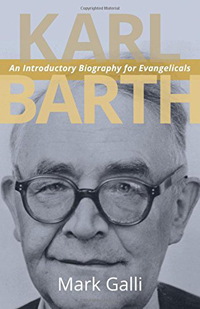 Mark Galli, Karl Barth: An Introductory Biography for Evangelicals (Grand Rapids: Eerdmans, 2017), 176pp.
Mark Galli, Karl Barth: An Introductory Biography for Evangelicals (Grand Rapids: Eerdmans, 2017), 176pp.
Any list of the most important theologians of the twentieth century would include the Swiss Protestant of the Reformed tradition Karl Barth (1886–1968) at or near the top. Barth was famous for his conversion away from the theological liberalism that was optimistic about human reason, experience, and history, and reductionistic in defining religion as ethics, to what became known as neo-orthodoxy. When World War I broke out in 1914, Barth was shocked to see the names of almost all his liberal seminary professors on a manifesto supporting Kaiser Wilhelm II. Christianity, said Barth, had been transformed into "42 centimeter cannons." His commentary on the book of Romans, which famously "fell like a bomb on the playground of the theologians," marked his definitive break. He was thirty-two years old.
Most of us will never read Barth's 9,000-page Church Dogmatics, or perhaps the still standard biography of Barth by his secretary Eberhard Busch, Karl Barth: His Life from Letters and Autobiographical Texts (1976), so this very reliable and short overview by Mark Galli is a welcome addition. Galli is Editor in Chief at Christianity Today magazine, and the author of numerous books. His biography of Barth is concise, confident, and appreciative, but not uncritical.
Of particular note is the subtitle to this book. Galli writes for and about the strange relationship between Barth and today's American evangelicals. As I have mentioned, Barth categorically repudiated theological liberalism, but it would still not be uncommon to hear an evangelical describe him as "too liberal." On the other hand, many other evangelicals do, in fact, have a deep appreciation for Barth. And finally, as Galli shows, there are actually some disturbing similarities between true liberalism and American evangelicalism regarding the reduction of the faith to subjective experience and ethics. And so, marvelously, Galli shows how Barth himself might provide a corrective to those very evangelicals who have been suspicious of him.


